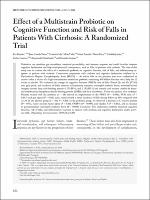| dc.contributor | Vall d'Hebron Barcelona Hospital Campus |
| dc.contributor.author | Román, Eva |
| dc.contributor.author | Nieto Sáchica, Juan Camilo |
| dc.contributor.author | Gely, Cristina |
| dc.contributor.author | Vidal, Sílvia |
| dc.contributor.author | Pozuelo Del Rio, Marta |
| dc.contributor.author | Poca Pastor, Ma Antonia |
| dc.contributor.author | Manichanh, Chaysavanh |
| dc.date.accessioned | 2019-07-04T06:16:29Z |
| dc.date.available | 2019-07-04T06:16:29Z |
| dc.date.issued | 2019-03-12 |
| dc.identifier.citation | Román E, Nieto JC, Gely C, Vidal S, Pozuelo M, Poca M, et al. Effect of a Multistrain Probiotic on Cognitive Function and Risk of Falls in Patients With Cirrhosis: A Randomized Trial. Hepatol Commun. 2019;3(5):632–45. |
| dc.identifier.issn | 2471-254X |
| dc.identifier.uri | https://hdl.handle.net/11351/4174 |
| dc.description | Cirrhosis; Probiotic; Cognitive function |
| dc.description.abstract | Probiotics can modulate gut microbiota, intestinal permeability, and immune response and could therefore improve cognitive dysfunction and help avoid potential consequences, such as falls, in patients with cirrhosis. The aim of this study was to evaluate the effect of a multistrain probiotic on cognitive function, risk of falls, and inflammatory response in patients with cirrhosis. Consecutive outpatients with cirrhosis and cognitive dysfunction (defined by a Psychometric Hepatic Encephalopathy Score [PHES] < -4) and/or falls in the previous year were randomized to receive either a sachet of a high-concentration multistrain probiotic containing 450 billion bacteria twice daily for 12 weeks or placebo. We evaluated the changes in cognitive function (PHES); risk of falls (Timed Up and Go [TUG] test, gait speed, and incidence of falls); systemic inflammatory response; neutrophil oxidative burst; intestinal barrier integrity (serum fatty acid-binding protein 6 [FABP-6] and 2 [FABP-2] and zonulin and urinary claudin-3); bacterial translocation (lipopolysaccharide-binding protein [LBP]); and fecal microbiota. Thirty-six patients were included. Patients treated with the probiotic (n = 18) showed an improvement in the PHES (P = 0.006), TUG time (P = 0.015) and gait speed (P = 0.02), and a trend toward a lower incidence of falls during follow-up (0% compared with 22.2% in the placebo group [n = 18]; P = 0.10). In the probiotic group, we observed a decrease in C-reactive protein (P = 0.01), tumor necrosis factor alpha (P = 0.01), FABP-6 (P = 0.009), and claudin-3 (P = 0.002), and an increase in poststimulation neutrophil oxidative burst (P = 0.002). Conclusion: The multistrain probiotic improved cognitive function, risk of falls, and inflammatory response in patients with cirrhosis and cognitive dysfunction and/or previous falls. |
| dc.language.iso | eng |
| dc.publisher | Wiley Open Access |
| dc.relation.ispartofseries | Hepatology Communications;3(5) |
| dc.rights | Attribution-NonCommercial-NoDerivatives 4.0 International |
| dc.rights.uri | http://creativecommons.org/licenses/by-nc-nd/4.0/ |
| dc.source | Scientia |
| dc.subject | Cirrosi hepàtica - Tractament |
| dc.subject | Probiòtics |
| dc.subject | Caigudes (Accidents) |
| dc.subject | Assaigs clínics |
| dc.subject.mesh | Liver Cirrhosis |
| dc.subject.mesh | /diet therapy |
| dc.subject.mesh | Probiotics |
| dc.subject.mesh | Accidental Falls |
| dc.subject.mesh | Randomized Controlled Trial |
| dc.title | Effect of a Multistrain Probiotic on Cognitive Function and Risk of Falls in Patients With Cirrhosis: A Randomized Trial. |
| dc.type | info:eu-repo/semantics/article |
| dc.identifier.doi | 10.1002/hep4.1325 |
| dc.subject.decs | cirrosis hepática |
| dc.subject.decs | /dietoterapia |
| dc.subject.decs | probióticos |
| dc.subject.decs | caídas accidentales |
| dc.subject.decs | ensayo clínico controlado aleatorizado |
| dc.relation.publishversion | https://aasldpubs.onlinelibrary.wiley.com/doi/full/10.1002/hep4.1325 |
| dc.type.version | info:eu-repo/semantics/publishedVersion |
| dc.audience | Professionals |
| dc.contributor.organismes | Institut Català de la Salut |
| dc.contributor.authoraffiliation | [Román E] Departament de Gastroenterologia, Hospital de la Santa Creu i Sant Pau, Barcelona, Spain. Escola Universitària d'Infermeria EUI-Sant Pau, Barcelona, Spain. Institut de Recerca IIB-Sant Pau, Barcelona, Spain. CIBERehd Instituto de Salud Carlos III, Madrid, Spain. [Nieto JC, Gely C] Institut de Recerca IIB-Sant Pau, Barcelona, Spain. [Vidal S] Institut de Recerca IIB-Sant Pau, Barcelona, Spain. Departament de Immunologia,Hospital de la Santa Creu i Sant Pau, Barcelona, Spain. Universitat Autònoma de Barcelona, Barcelona, Spain. [Pozuelo M] Vall d’Hebron Institut de Recerca, Barcelona, Spain. [Poca M] Departament de Gastroenterologia, Hospital de la Santa Creu i Sant Pau, Barcelona, Spain. CIBERehd Instituto de Salud Carlos III, Madrid, Spain. [Manichanh C] Vall d’Hebron Institut de Recerca, Barcelona, Spain. CIBERehd Instituto de Salud Carlos III, Madrid, Spain. |
| dc.identifier.pmid | 31061952 |
| dc.identifier.wos | WOS:000466288700005 |
| dc.rights.accessrights | info:eu-repo/semantics/openAccess |

